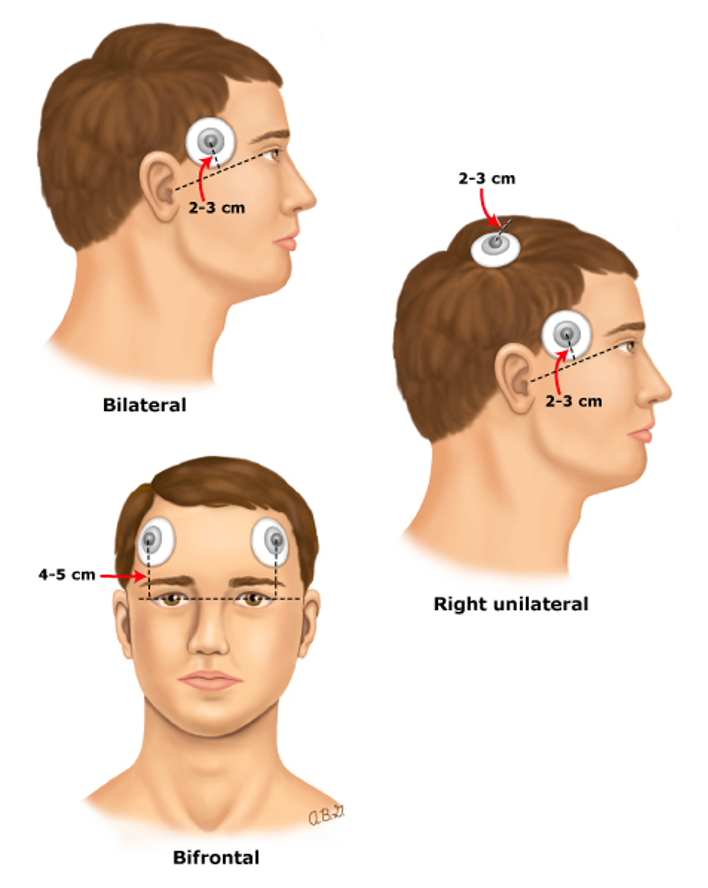
Electroconvulsive therapy (ECT) is a safe and effective treatment for mental health conditions, including major depression, bipolar disorder, and schizophrenia, which have not improved from other treatments, such as medications and psychotherapy. Treatment is administered under general anesthesia. ECT treatment involves applying a small, controlled current between two metal discs, called electrodes, which are placed on the scalp and/or temple. The current passes through a specific part of the brain, which stimulates a targeted area of the brain. It is believed that ECT works by affecting the neurotransmitters in the brain that transfer messages between nerve cells, which are altered in mood disorders. These changes in brain pathways result in improved depressive symptoms.
Our program offers electroconvulsive therapy (ECT) for individuals with treatment resistant depression and other mental disorders. ECT is a safe and effective treatment for individuals who have not benefited from medications, psychotherapy, or other treatments.
ECT involves administering a brief, controlled electrical current between two metal discs (electrodes) which are applied on the surface of the scalp or temple. The current stimulates a specific part of the brain and causes a small, controlled seizure which lasts between 15 and 90 seconds. This is done while you are under general anesthesia, and you will be asleep for about 5 to 10 minutes. You will be monitored by an anesthesiologist during your treatment. A course of ECT treatment will involve repeated treatment sessions.
By triggering brief, controlled seizures, ECT is associated with a number of neurophysiological changes. It affects many neurotransmitters which are implicated in mental disorders, which results in improvements in depressive symptoms.
On average, a course of treatment will involve 12 sessions, with approximately 2 to 3 sessions per week, however this will be determined by your doctor based on individual needs.
Some of the therapeutic effects of ECT may be evident within 3 treatment sessions for some individuals, however this may take longer for others. It is recommended to complete the full course of treatment to see full therapeutics effects.
ECT is recommended for people with severe mental illness, such as treatment resistant depression, bipolar disorder, and schizophrenia. It is used experimentally in other conditions at this time. It is not a first-line treatment, meaning that it should be considered after people have not responded to other conventional treatments, including medications, psychotherapy, and other forms of neurostimulation. However, for some people with severe disease with life-threatening symptoms, ECT can be considered.
To be eligible for treatment, you must be medically stable and cleared by an anesthesiologist.
Current research has shown that up to 70-80% of individuals show an improvement in depressive symptoms, and up to 60% of people with depression can achieve remission with a course of ECT treatment.
Although ECT can be very effective for many people with severe mental illness, it is not a cure and other types of treatment may need to be continued to maintain positive effects. This maintenance therapy could involve medications, psychotherapy, other brain stimulation treatments, or ongoing ECT treatments.
The most common side effects of ECT include headache and muscle pain or stiffness. Some individuals may experience confusion, nausea, or high blood pressure, but these side effects are temporary. Some individuals may experience memory impairments which can last between several weeks to months.
Most medications can be continued during your ECT treatment. Your psychiatrist will review your medications prior to starting treatment with ECT.
Medications that may affect the seizure threshold will be evaluated and may be changed accordingly. Irreversible monoamine oxidase inhibitors (MAOIs) should be discontinued 14 days prior to ECT.
No, there is no cost to you to receive ECT treatment?
If you are having thoughts of harming yourself at any time, please call the Greater Toronto Distress Centre Helpline 416-408-HELP (4357) or visit your nearest emergency department. In this situation, please do not use the clinic voicemail or email, as it may not be possible to provide an immediate response.